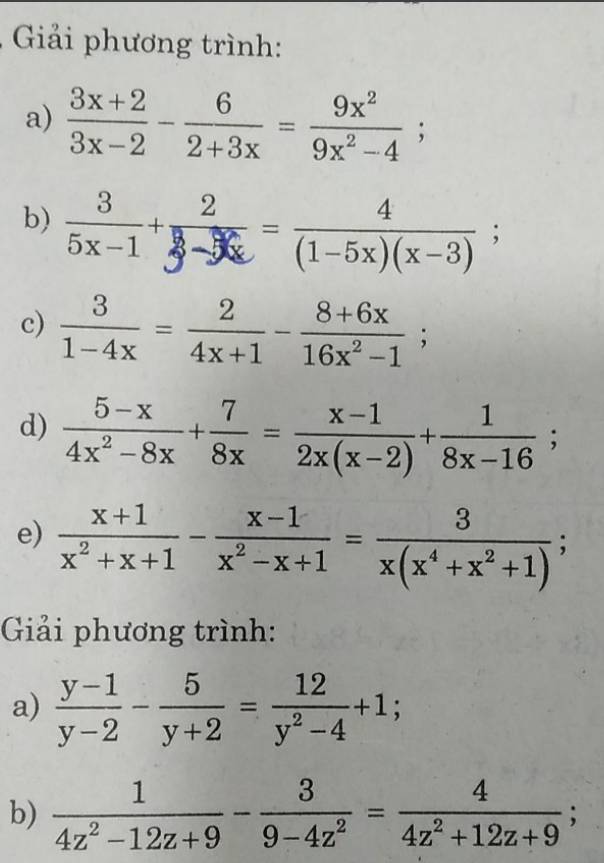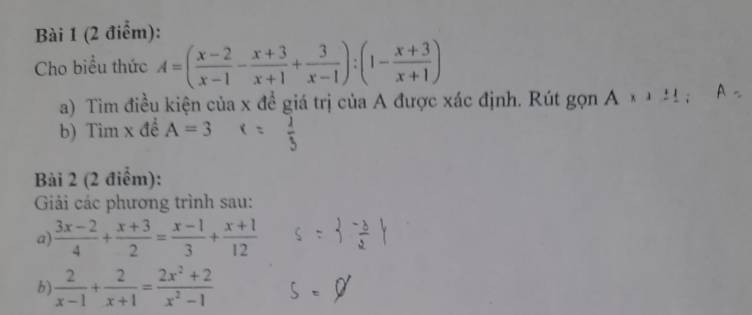
Hãy nhập câu hỏi của bạn vào đây, nếu là tài khoản VIP, bạn sẽ được ưu tiên trả lời.


Bài 1:
a: \(\Leftrightarrow\left(3x+2\right)^2-6\left(3x-2\right)=9x^2\)
\(\Leftrightarrow9x^2+12x+4-18x+12=9x^2\)
=>-6x+16=0
=>-6x=-16
=>x=8/3
b: \(\Leftrightarrow3\left(3-x\right)+2\left(5x-1\right)=4\)
=>9-3x+10x-2=4
=>7x+7=4
=>7x=-3
=>x=-3/7
c: \(\Leftrightarrow-3\left(4x+1\right)=2\left(4x-1\right)-6x-8\)
=>\(-12x-3=8x-2-6x-8=2x-10\)
=>-14x=-7
=>x=1/2
d: \(\Leftrightarrow\dfrac{5-x}{4x\left(x-2\right)}+\dfrac{7}{8x}=\dfrac{x-1}{2x\left(x-2\right)}+\dfrac{1}{8\left(x-2\right)}\)
\(\Leftrightarrow2\left(5-x\right)+7\left(x-2\right)=4\left(x-1\right)+x\)
=>\(10-2x+7x-14=4x-4+x=5x-4\)
=>5x-4=5x-4(luôn đúng)
=>S=R\{0;2}
e: \(\Leftrightarrow x^3+1-x^3+1=\dfrac{3}{x}\)
=>\(2x=3\)
=>x=3/2

\(VP=\left(a+b\right)^2-4ab=a^2+2ab+b^2-4ab=a^2-2ab+b^2=\left(a-b\right)^2=VT\left(đpcm\right)\)

\(\left(x^2-1\right)\left(2x+3\right)=\left(x^2-1\right)\left(3x+2\right)\)
\(\Leftrightarrow\left(x^2-1\right)\left(2x+3\right)-\left(x^2-1\right)\left(3x+2\right)=0\)
\(\Leftrightarrow\left(x^2-1\right)\left(2x+3-3x-2\right)=0\)
\(\Leftrightarrow\left(x^2-1\right)\left(-x+1\right)=0\)
\(\Leftrightarrow\orbr{\begin{cases}x=1\\x=-1\end{cases}}\)
Vậy....
=> ( x2 -1 )( 2x +3) - ( x2 - 1)( 3x +2 ) =0
=> (x2 - 1). ( 2x +3 - 3x - 2) =0
=> ( x2- 1)( 1-x) = 0
=> x2 - 1 =0 hoặc 1 - x =0
=> x= 1

\(D=\left(\dfrac{3}{4}xy+3y\right)\left(x-12y\right)\\ =x\left(\dfrac{3}{4}xy+3y\right)-12y\left(\dfrac{3}{4}xy+3y\right)\\ =\dfrac{3}{4}x^2y+3xy-9xy^2-36y^2\)

Lời giải:
Điều kiện: $x\neq 0; -1$
$\frac{x+3}{x+1}-2=\frac{1-x}{x}$
$1+\frac{2}{x+1}-2=\frac{1}{x}-1$
$\frac{2}{x+1}-1=\frac{1}{x}-1$
$\frac{2}{x+1}=\frac{1}{x}$
$\Rightarrow 2x=x+1$
$\Leftrightarrow x=1$ (thỏa mãn)

f(x) = x4 - 9x3 + 21x2 + ax + b
g(x) = x2 - x - 2
Ta có f(x) bậc 4 ; g(x) bậc 2
=> Thương là một đa thức bậc 2
Gọi đa thức thương đó là h(x) = x2 + cx + d
Ta có f(x) chia hết cho g(x)
<=> x4 - 9x3 + 21x2 + ax + b = ( x2 - x - 2 )( x2 + cx + d )
<=> x4 - 9x3 + 21x2 + ax + b = x4 + cx3 + dx2 - x3 - cx2 - dx - 2x2 - 2cx - 2d
<=> x4 - 9x3 + 21x2 + ax + b = x4 + ( c - 1 )x3 + ( d - c - 2 )x2 + ( -d - 2c )x - 2d
Đồng nhất hệ số ta được :
\(\hept{\begin{cases}c-1=-9\\d-c-2=21\\-d-2c=a\end{cases}};-2d=b\)
\(\Rightarrow\hept{\begin{cases}c=-8\\d=15\\a=1\end{cases}};b=-30\)
\(\Rightarrow\hept{\begin{cases}a=1\\b=-30\end{cases}}\)
Vậy ...

Bài 1. (a) Điều kiện: \(x\ne\pm1\).
Ta có: \(A=\left(\dfrac{x-2}{x-1}-\dfrac{x+3}{x+1}+\dfrac{3}{x-1}\right):\left(1-\dfrac{x+3}{x+1}\right)\)
\(=\left(\dfrac{x-2+3}{x-1}-\dfrac{x+3}{x+1}\right):\dfrac{x+1-\left(x+3\right)}{x+1}\)
\(=\left(\dfrac{x+1}{x-1}-\dfrac{x+3}{x+1}\right):\dfrac{x+1-x-3}{x+1}\)
\(=\dfrac{\left(x+1\right)^2-\left(x+3\right)\left(x-1\right)}{\left(x-1\right)\left(x+1\right)}:\dfrac{-2}{x+1}\)
\(=\dfrac{x^2+2x+1-x^2-2x+3}{\left(x-1\right)\left(x+1\right)}\cdot\dfrac{x+1}{-2}\)
\(=\dfrac{4}{\left(x-1\right)\left(x+1\right)}\cdot\dfrac{x+1}{-2}=\dfrac{2}{1-x}\)
Vậy: \(A=\dfrac{2}{1-x}\)
(b) \(A=3\Leftrightarrow\dfrac{2}{1-x}=3\)
\(\Rightarrow1-x=\dfrac{2}{3}\Leftrightarrow x=\dfrac{1}{3}\left(TM\right)\)
Vậy: \(x=\dfrac{1}{3}\)
Bài 2. (a) Phương trình tương đương với:
\(\dfrac{3\left(3x-2\right)}{12}+\dfrac{6\left(x+3\right)}{12}=\dfrac{4\left(x-1\right)}{12}+\dfrac{x+1}{12}\)
\(\Rightarrow3\left(3x-2\right)+6\left(x+3\right)=4\left(x-1\right)+x+1\)
\(\Leftrightarrow9x-6+6x+18=4x-4+x+1\)
\(\Leftrightarrow10x=-15\Leftrightarrow x=-\dfrac{3}{2}\)
Vậy: Phương trình có tập nghiệm \(S=\left\{-\dfrac{3}{2}\right\}\).
(b) Điều kiện: \(x\ne\pm1\). Phương trình tương đương với:
\(\dfrac{2\left(x+1\right)}{\left(x-1\right)\left(x+1\right)}+\dfrac{2\left(x-1\right)}{\left(x+1\right)\left(x-1\right)}=\dfrac{2x^2+2}{\left(x+1\right)\left(x-1\right)}\)
\(\Rightarrow2\left(x+1\right)+2\left(x-1\right)=2x^2+2\)
\(\Leftrightarrow2x+2+2x-2=2x^2+2\)
\(\Leftrightarrow2x^2-4x+2=0\Leftrightarrow2\left(x^2-2x+1\right)=0\)
\(\Leftrightarrow2\left(x-1\right)^2=0\Rightarrow x-1=0\Leftrightarrow x=1\left(KTM\right)\)
Vậy: Phương trình có tập nghiệm \(S=\varnothing\)

Xét tam giác ABC vuông cân có:
\(BC^2=AB^2+AC^2=2AB^2=200\Rightarrow BC=10\sqrt{2}\)(cm)
P△ABC=AB+AC+BC=10.2+10=30(cm)
S△ABC=\(\dfrac{1}{2}AB.AC=\dfrac{1}{2}.10.10=50\left(cm^2\right)\)
Cho mình sửa lại: PΔABC=AB+AC+BC=\(10.2+10\sqrt{2}=20+10\sqrt{2}\left(cm\right)\)

\(D=\dfrac{x^2}{x^2-1}+\dfrac{1}{x^2-x^4}=\dfrac{x^4}{x^2\left(x^2-1\right)}-\dfrac{1}{x^2\left(x^2-1\right)}=\dfrac{x^4-1}{x^2\left(x^2-1\right)}=\dfrac{\left(x^2-1\right)\left(x^2+1\right)}{x^2\left(x^2-1\right)}=\dfrac{x^2+1}{x^2}=1+\dfrac{1}{x^2}\)
do \(x\ne0,\pm1\Rightarrow\dfrac{1}{x^2}>0\Rightarrow1+\dfrac{1}{x^2}>1\Rightarrow D>1\left(đpcm\right)\)
\(D=\dfrac{x^2}{x^2-1}+\dfrac{1}{x^2-x^4}\\ =\dfrac{x^4\left(1-x\right)}{\left(x-1\right)\left(x+1\right)\left(1-x\right)x^2}+\dfrac{x-1}{x^2\left(1-x\right)\left(1+x\right)\left(x-1\right)}\\ =\dfrac{x^4-x^5+x-1}{x^2\left(1-x\right)\left(1+x\right)\left(x-1\right)}\\ =\dfrac{-\left(x-1\right)^2\left(x^2+1\right)\left(x+1\right)}{-x^2\left(x-1\right)^2\left(x+1\right)}\\ =\dfrac{x^2+1}{x^2}>1\left(đpcm\right)\)
(x2 + 1 luôn lớn hơn x2)


 mn giup mik bai 3 nay dc ko aj
mn giup mik bai 3 nay dc ko aj
Gì đấy bạn